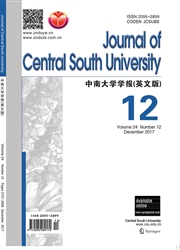

 中文摘要:
中文摘要:
For deposit body medium, the internal structural properties may be the controlling factors for the strength of the material and the mechanical response. Based on the results of soil-rock meso-statistics using digital imaging, a simulated annealing algorithm is adopted to expand the meso-structural features of deposit bodies in 3D. The construction of the 3D meso-structure of a deposit body is achieved, and then the particle flow analysis program PFC3 D is used to simulate the mechanical properties of the deposit body. It is shown that with a combination of the simulated annealing algorithm and the statistical feature functions, the randomness and heterogeneity of the rock distribution in the 3D inner structure of deposit body medium can be realized, and the reconstructed structural features of the deposit medium can match the features of the digital images well. The spatial utilizations and the compacting effects of the body-centered cubic, hexagonal close and face-centered packing models are high, so these structures can be applied in the simulations of the deposit structures. However, the shear features of the deposit medium vary depending on the different model constructive modes. Rocks, which are the backbone of the deposit, are the factors that determine the shear strength and deformation modulus of the deposit body. The modeling method proposed is useful for the construction of 3D meso-scope models from 2D meso-scope statistics and can be used for studying the mechanical properties of mixed media, such as deposit bodies.
 英文摘要:
英文摘要:
For deposit body medium, the internal structural properties may be the controlling factors for the strength of the material and the mechanical response. Based on the results of soil-rock meso-statistics using digital imaging, a simulated annealing algorithm is adopted to expand the meso-structural features of deposit bodies in 3D. The construction of the 3D meso-structure of a deposit body is achieved, and then the particle flow analysis program PFC3 D is used to simulate the mechanical properties of the deposit body. It is shown that with a combination of the simulated annealing algorithm and the statistical feature functions, the randomness and heterogeneity of the rock distribution in the 3D inner structure of deposit body medium can be realized, and the reconstructed structural features of the deposit medium can match the features of the digital images well. The spatial utilizations and the compacting effects of the body-centered cubic, hexagonal close and face-centered packing models are high, so these structures can be applied in the simulations of the deposit structures. However, the shear features of the deposit medium vary depending on the different model constructive modes. Rocks, which are the backbone of the deposit, are the factors that determine the shear strength and deformation modulus of the deposit body. The modeling method proposed is useful for the construction of 3D meso-scope models from 2D meso-scope statistics and can be used for studying the mechanical properties of mixed media, such as deposit bodies.
 同期刊论文项目
同期刊论文项目
 同项目期刊论文
同项目期刊论文
 Mesomechanical simulation of direct shear test on outwash deposits with granular discrete element me
Mesomechanical simulation of direct shear test on outwash deposits with granular discrete element me Strength prediction of dry and saturated brittle rocks by unilateraldamage-friction coupling analyse
Strength prediction of dry and saturated brittle rocks by unilateraldamage-friction coupling analyse 期刊信息
期刊信息
